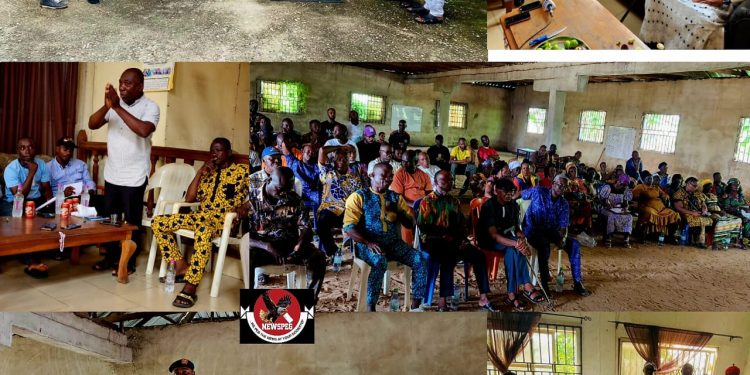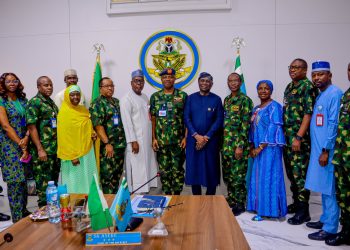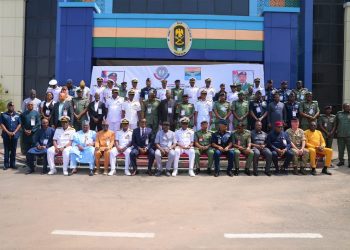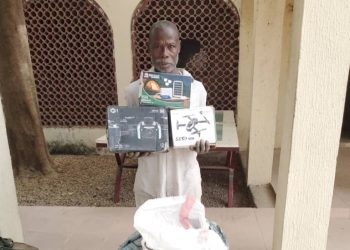By Nkechi Eze
As part of a broader initiative to foster national unity and enhance civil-military relations through non-kinetic methods, the Armed Forces of Nigeria have reaffirmed their commitment to cultural diplomacy and community engagement. The campaign, spearheaded by the Chief of Defence Staff (CDS), General Christopher Gwabin Musa, promotes a people-centered security philosophy grounded in dialogue, trust-building, and collaboration.
A high-powered delegation from the Defence Headquarters, led by Group Captain Ibrahim Ali Bukar and Captain Joseph Baba Akubo, representing Brigadier General Ibrahim Abbas Muazu, Commander of the 34 Artillery Brigade, Owerri, recently paid a strategic visit to the Mgbirichi/Abakuru community and the Obinze Ancient Kingdom in Imo State. The engagement, which also featured defence correspondents, reflected the military’s renewed commitment to strengthening grassroots relationships, fostering dialogue, and deepening mutual understanding with its host communities. Reporting from Owerri, Nkechi Eze of Newspeg Magazine and Newspeg online, brings the details.
People-Centered Security in Action
Speaking at Mgbirichi/Abakuru, Group Captain Ibrahim Bukar emphasized that the military’s current strategy, as envisioned by the CDS, recognizes that kinetic operations alone are insufficient to address the country’s complex security challenges. “The CDS believes that while we confront threats with kinetic force, it is equally important to adopt non-kinetic measure, where we talk to our people, build trust, and foster community ownership of security efforts.” He said.
He noted that the military has been engaged in non-kinetic interventions such as medical outreaches, sports tournaments, cultural engagements, and community sensitization programmes, all of which are aimed at building trust and shared responsibility for security. “We’ve been fighting insecurity and insurgency for over a decade and intelligence often comes from civilians who observe their surroundings,” he explained.
Bukar reiterated that “there’s no security force without the people, and the people also need the Armed Forces. We are here to talk to you, listen to your concerns, and work together for peace.” He encouraged community leaders to help counter misinformation, especially on social media, and promote verified narratives. He called on traditional and political leaders to use their influence to facilitate peace through dialogue, saying, “We must see ourselves as partners. The military alone cannot achieve lasting peace without the cooperation of the communities. If you see something, say something, so that something can be done.”
Community Leaders Raise Critical Issues
Welcoming the delegation, His Majesty Eze A.R. Ikegwuruka Ezeahurukwe II, Paramount Ruler of Mgbirichi/Abakuru, described the initiative as historic and long overdue. He appreciated the Chief of Defence staff gesture and noted that the community had long maintained a peaceful relationship with the 34 Artillery Brigade, dating back to 1978. However, he expressed concern about emerging tensions stemming from unclear land boundaries, fencing activities, and lack of compensation for donated land. While maintaining that the community remains peaceful, he urged the military to improve coordination and communication with local authorities. He also pointed to increasing farmer-herder conflicts during farming seasons and called for a balanced and respectful approach to resolving them, stating, “We all eat meat and vegetables, let’s respect one another’s rights and live in harmony.”
Mr. Uchendu Orie, Secretary General of the Mgbirichi Town Union, decried the worsening impact of herder activities on agriculture. He noted that destruction of farmland has devastated the community’s agrarian economy and pushed families into poverty. “Our people no longer have farmland to cultivate, Our standard of living has declined sharply,” he said. He also appealed for the return of excess military lands that are not in use, referencing boundaries set by the state government in the 1970s.
In response, Capt. Joseph Baba Akubo clarified that the fencing project and most land-related directives emanate from Abuja and not the local brigade. “We at the brigade level are not directly responsible for the fencing; it is being handled from Abuja,” he said. He, however, assured that the concerns raised would be reported and escalated to appropriate quarters.
Group Captain Bukar added that his presence was on the instruction of the Chief of Defence Staff who is committed to peaceful engagement. “We will escalate your concerns,” he assured. He commended the community for its peaceful conduct and urged them to remain calm while authorities investigate and address the land issues.
Obinze Speaks: Security, Abandonment, and Community Neglect
At the Obinze Ancient Kingdom, His Royal Highness Eze A.C. Enyinnaya (JP) Nzeukwu lamented a growing disconnect between the community and the military, recalling that in earlier years soldiers were more integrated into the community. He noted that in recent years, especially after the departure of a former brigade commander, interactions have dwindled. “Since around March, things have not been the same, soldiers now isolate themselves,” he said. He called for the restoration of friendly ties, urging the military to identify key community figures and re-engage sincerely.
Comrade Hilary Okoreafor, the President General of the Obinze community, raised alarm over escalating insecurity. He said a particular part of the community had become a hotspot for drug abuse, robbery, and criminal activity, likening it to a “ghetto.” He noted that residents and even security personnel feared venturing into the area. He also condemned the exploitation of the community’s gravel and land resources without local benefit.
Hon. Ukwuoma Nnaemeka, Councillor representing Obinze Ward 8, echoed these sentiments, citing unresolved boundary issues between the military barracks and community land. “We are not dragging anything with the barracks, but they should respect the existing boundaries,” he said. He urged that the issue be escalated to Defence Headquarters, noting that insecurity had reached a critical level. “Over 40 of our boys have been kidnapped in that area, and they all say it’s the same group of boys, the Fulani herders” he reported. He also highlighted the recent attack on a student from the Federal Polytechnic and lamented that many residents now avoid going outside after 6 p.m. for fear of being kidnapped.
Despite these issues, he acknowledged some positive contributions, especially in the education sector. “Last time I went to Army Day School, you renovated the place, it is now a very befitting learning environment,” he said, calling for similar support for community schools.
Justice and Accountability for Land Disputes
Ephraim Ogarawo shared a personal story of how some community members were detained in the barracks for two days during a land-related dispute. He thanked an officer who helped prevent escalation but lamented that subsequent attempts to resolve the matter with the new commander had been unproductive. “Last two months, we went to him, i submitted the documents he asked for an nothing happened,” he said. He condemned illegal land sales allegedly linked to military personnel and government collaborators, stating, “This land that they are selling currently, the people that own the land are suffering. It’s too bad.” He appealed to the military for justice and restoration of community land.
Army Response: Clarifications and Collaborations
Responding to the allegations and security concerns, Capt. Akubo highlighted the army’s recent interventions in nearby communities, citing a successful operation in Amakohia where six to seven suspects were neutralized. “We didn’t do it alone. We worked with the community,” he said. He stressed that the military requires timely intelligence to act effectively. “We need timely intelligence, if those in charge don’t know your leaders, how can we help?”
On accusations that the army is involved in dredging and sand sales, he gave a firm denial. “The army does not own any dredging machine, if anyone is collecting N500,000 using the army’s name, they are impersonators,” he stated. He shared an example of civilians fraudulently using the army’s identity for extortion. “We discovered some people, we had to send military police and intelligence teams to investigate.”
He explained that the core issue is unresolved land ownership. “There’s a dispute over the land, that is the real issue, not dredging,” he said. He also noted that when the army demolishes illegal structures, it is sometimes unfairly criticized for being high-handed.
Regarding military recruitment, Akubo clarified that the process is transparent and entirely online. “The recruitment is online, we posted the posters everywhere, even at Mammy Market,” he said. He acknowledged low awareness in the region and added, “If your quota isn’t filled, it becomes a problem of marginalization. But if you don’t apply, there’s no way we can help.” He called on youths to take advantage of the opportunity and on leaders to assist in disseminating accurate information.
He concluded by calling on the community to identify internal saboteurs. “There are people within your communities working with bad actors. Help us identify them. These kinds of interactions help us all.”
Closing Appeal and Commitment to Ongoing Dialogue
In his final remarks, His Royal Highness Eze A.C. Enyinnaya expressed appreciation for the renewed communication. “One step today, maybe two tomorrow, 100 years is never forever,” he said. He also raised concerns over soldiers who had overstayed in the community without meaningful engagement. “There are some soldiers who have been here over five years, they just drink and engage in inappropriate behavior,” he said.
He called for rotation and personnel management to ensure professionalism. “Please investigate. Those who have overstayed should pass on their knowledge and move on.”
Chief Prince A.U. Ikegwuwka, the Traditional Prime Minister of Mgbirichi/Abakuru, said the visit had rekindled hope. He stressed that dialogue remained the best approach to addressing grievances and building unity. “We are committed to doing our part to rebuild this relationship,” he said.
The outreach concluded on a hopeful note, with both sides pledging to sustain dialogue, deepen mutual understanding, and work together to secure peace, justice, and progress for all.
















